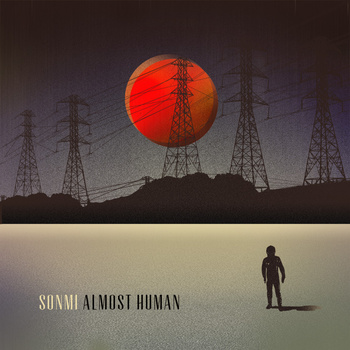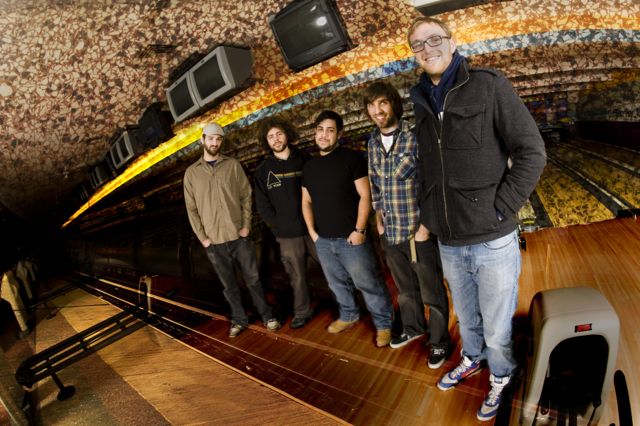Brooklyn-based experimental funk-rock outfit Dopapod likes a palindrome: The band’s own name, for example, is spelled the same, forward and backward. And its live album, I Saw Live Dopapod, Evil Was I. Palindrome. Aaaaaand, while we’re at it, the band’s sophomore full-length, Drawn Onward, which dropped earlier this year. Total palindrome.
Now, whether or not Dopapod’s songs are palindromic (if this isn’t a thing yet, this band really needs to compose some same-backward-and-forward music) is not confirmed. This is what the group says about its own sound: “Dopapod exists at the crossroads of full throttle intensity, deep pocket groove, intricate technicality, and limitless experimentation. With no regard towards towards stylistic boundaries, the sound that emerges from the quartet both live and in the studio is as varied and diverse as the many influences that they adapt from.”
In the midst of a huge fall tour, Dopapod makes its way to Asheville on Friday, Sept. 21, for a show at Asheville Music Hall. Locals Sonmi open. 9 p.m., $8 in advance or $10 at the door.
Xpress will give away a pair of tickets tomorrow, at 1 p.m., on Facebook.
Here’s the full story (originally published in Xpress’ Aug. 22 issue) about Sonmi’s new album, Almost Human:
What Sonmi’s percussionist Dave Mathes wants you to know about the local band’s new album, Almost Human, is that it’s designed to be played loud, “because you can crank it up and it still sounds really smooth and warm.” It has to do with compression and headroom and things that probably don’t matter much to the average listener. Those things do matter to Sonmi, though. So much so that they spent about three years working on Human.
So much so that, after being disappointed by two engineers, the band built its own studio and taught themselves to record.
So much so that, even though Human is an experimental electronic music album, it was recorded to tape and is mostly analog, in order to preserve the dynamic range.

“There were only a couple of things that were digital,” Mathes says. Vocal samples and occasional software synthesizers were digital, “everything else was a real instrument or an analog synth.” And even in the case of those software synths, they were still passed through analog compression, pre-amps and EQ to achieve an analog sound.
“We really went all-out to get it to sound warm,” Mathes says. Or, human. Which is a theme of the record. Mathes says that the title relates to “our lifestyles speeding up so rapidly because of technology. We’re forgetting that we’re supposed to connect with each other emotionally, as opposed to on a Facebook page.”
At the same time, Mathes says the biggest criticism Sonmi gets from friends and family is that their music “lacks a cognitive direction.”
“Sometimes people are wanting some kind of human vocal element to lead them to the space we’re creating,” Mathes says. A few tracks, like, “Future 26,” do have vocal samples. That’s also the most-layered song on the album. (Each track takes about 80 hours to build, with 60 tracks of audio per song.)
There’s a lot of technical know-how that goes into not just Sonmi’s album, but what the band does on stage. In fact, Mathes admits that they make it harder on themselves than they need to: “You see us up there not interacting [with the audience] because we’re so engaged in making it right. Most of the tracks, we’re with a computer click. It has to be on. Everyone has to hit their buttons.” This winter, Sonmi plans to take a hiatus and rework its live show, allowing greater communication and spontaneity.
Mathes comes to the project with a degree in music education; still, he says, the band has “train wrecked the songs 100,000 times” to get them right. But there’s much more to Sonmi’s sound than computers. There’s an emotional connection to the music (much like in classical composition) that results in some very lush, organic soundscapes. Human’s final track, “Vespers,” is a languid and shimmery journey through outer space. “Tunnels” combines locomotion and industrial grind, but there’s also an airiness: a lightness of clouds moving, trees bending in the wind and cool mist descending over high mountain passes.
The band’s process, says Mathes, is to “take a produced track and bandify it. You have some type of synthesizer, some type of bass sound, some type of beat, and you pick and choose what you think should stay.” Sonmi’s main producers are Mathes and Mike McBride (aka Peripheral, on synthesizers); the band also includes Robert Garmhausen on guitar and MPC, and Nigel Gilmer on bass, synthesizers and electronics.
“Everyone has an equal amount of say-so about what they like and don’t like about a track,” says Mathes. “When we give a track out and say this is something we want to produce live, we allow for it to go other places.” Mathes describes Garmhausen as a minimalist and Gilmer as a maximalist who crafts dense sounds — a perfect balance to each other.
“A lot of what we deal with is how to orchestrate something,” Mathes says. When Sonmi creates new songs, the goal is “to be as inspired by the sounds you’re hearing as the sounds you’re creating” and to stumble upon what the drummer calls happy little accidents.
He adds, “we can jam and make something absolutely wonderful, and then spend a year trying to recreate what we just did on the fly.”
Human is the culmination of years of hard work and happy accidents, of human creativity and mechanical ingenuity. It’s also a road map of where Sonmi has been, though Mathes says the band has already moved beyond the album’s 10 tracks.
“We have tons of ideas, almost so many that it’s a problem,” he says. “But that’s a good problem to have.”



“if this isn’t a thing yet, this band really needs to compose some same-backward-and-forward music”
B